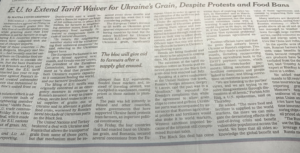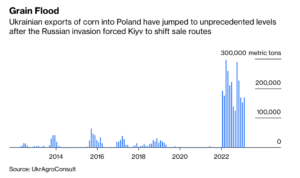
Financial Times writer Andy Bounds reported late last week that, “Poland and three other EU member states are to lift a ban on imports of Ukrainian foodstuffs under a deal reached with Brussels on Friday.
“The unilateral measures had raised tensions with other member states who accused Poland, Hungary, Slovakia and Bulgaria of deserting Kyiv in its hour of need as it fights Russian aggression.
“The European Commission will impose temporary curbs on a more limited range of products, accepting that a glut of grain in the countries has caused hardship for their farmers.”
WE HAVE A DEAL
@EU_Commission has reached an agreement in principle with Bulgaria, Hungary, Poland, Romania & Slovakia regarding #Ukraine agri-food products.
We have acted to address concerns of both farmers in neighbouring EU countries and Ukraine
– with @jwojc
1/3 pic.twitter.com/qNP93X1Fpd
— Valdis Dombrovskis (@VDombrovskis) April 28, 2023
Bounds explained that, “The measures will also cover Romania which had also complained about low grain prices as its warehouses filled with Ukrainian imports. However, it had not taken unilateral action. They are expected to take effect in the coming weeks.
Wheat, maize, oilseed and sunflower seed will only be allowed into those countries if they are in transit to other destinations.
“The five countries will receive €100mn from EU funds to compensate farmers,” the FT article said.
Matina Stevis-Gridneff reported in Saturday’s New York Times that, “European Union ambassadors agreed on Friday to allow Ukraine’s grains into the bloc free of tariffs for another year, while granting more than $100 million in aid for farmers in neighboring E.U. countries where crop prices have collapsed with the flood of cheaper imports.”

“[Valdis Dombrovskis, the E.U. trade commissioner] said it would include a financial support package of 100 million euros, or about $110 million, for farmers in neighboring member states, from an E.U. emergency fund normally reserved to compensate them in case of natural disasters.”
The Times article added that, “Under the agreement, [Dombrovskis] said, certain types of Ukrainian grains — among them wheat and sunflower seeds — will only be permitted to transit through those nations on their way to other destinations, and not to be sold there. Officials hope that this will soften the effects on farmers in Ukraine’s neighboring states.
“Details are being finalized and are likely to be adopted in coming days, Mr. Dombrovskis said.
“The extension of the tariff exemption comes as Russia puts renewed pressure on the Black Sea grain deal first enacted last July.”

Reuters writers Andrew Gray and Sudip Kar-Gupta reported on Friday that, “[Bulgaria, Hungary, Poland, Romania and Slovakia] became transit routes for Ukrainian grain that could not be exported through the country’s Black Sea ports because of Russia’s invasion.
“Bottlenecks then trapped millions of tons of grains in countries bordering Ukraine, forcing local farmers to compete with an influx of cheap Ukrainian imports that they said distorted prices and demand.
“European Commission President Ursula von der Leyen said the deal ‘preserves both Ukraine’s exports capacity so it continues feeding the world, and our farmers’ livelihoods.’”
I welcome the agreement in principle found on the transit of 4 types of Ukrainian grain and seeds.
A deal that preserves both Ukraine’s exports capacity so it continues feeding the world, and our farmers’ livelihoods.
Thank you @VDombrovskis and @jwojc for your efforts. https://t.co/9TqtuG1gla
— Ursula von der Leyen (@vonderleyen) April 28, 2023
Also on Friday, Bloomberg writer Piotr Skolimowski reported that, “While the transit of Ukrainian grain has added to pressure on logistics in eastern Europe, global grain prices have fallen due to big harvests in major producers like Russia and Australia.
“Farmers are a key voter base for political parties in Poland ahead of October elections. The ban came as a surprise, since Poland has been among the staunchest supporters of Ukraine since it was attacked by Russia last year.”







